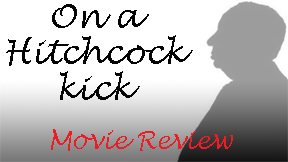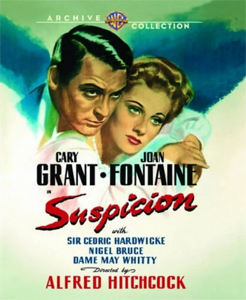Just one year after “Rebecca,” director Alfred Hitchcock and actress Joan Fontaine made the very similarly themed “Suspicion” (1941). It’s a classic example of an actress winning a make-up Oscar, as the Academy had snubbed her for “Rebecca.”
Fontaine and Cary Grant are good as a couple who probably shouldn’t be married, but are because they love each other. Again boosted by a wall-of-sound score from Franz Waxman, “Suspicion” is very watchable from start to finish.
Fontaine’s bookish Lina falls for Grant’s suave Johnnie with that quickness that was more common in 1941 than today. Her character in “Rebecca” wants a stable life, whereas Lina wants to get away from the staid stability under her parents’ roof.

“Suspicion” (1941)
Director: Alfred Hitchcock
Writers: Samson Raphaelson, Joan Harrison, Alma Reville; Anthony Berkeley (novel)
Stars: Cary Grant, Joan Fontaine, Nigel Bruce
Caught in another trap
But Johnnie is a thief, a liar and a gambling addict – and again Fontaine’s heroine has to wonder if she married into a trap. She knows Johnnie stole 2,000 pounds from his previous employer, who isn’t pressing charges (yet) only because he’s his cousin. (Although this is an American production, it’s set in Britain.)
The logistics of Johnnie’s scheming life don’t quite make sense, even considering this is a Hitchcock film, and sometimes the art of suspense doesn’t require that every “I” be dotted and “T” be crossed. He says he’s been broke his whole life, but the newlyweds move into a grand house with a servant. It’s not clear if they are renting or buying, but if he’s penniless and she’s only getting a basic allowance from her folks, it doesn’t add up.
As the title suggests, the major point of “Suspicion” is that Lina suspects Johnnie is a murderer (a friend dies on a road trip with him) and also plotting her murder. Hitchcock does the artistic things we’d suspect (no pun intended), including the famous shot where he lights a glass of milk in a dark scene to make us think it is poisoned.
I feel the plotting here is rather weak, although it merely nagged at me on the first viewing since the two leads are so good — as is Nigel Bruce as Beaky, who insists to Lina that her husband is just “Johnnie being Johnnie,” and Auriol Lee as a mystery-author friend of Lina’s.
The more I think about it, I wish the more twisty ending of the source material, Anthony Berkeley’s novel “Before the Fact,” had been used. It’s not entirely the fault of Hitchcock or the screenwriters (Samson Raphaelson, Joan Harrison and Hitch’s wife Alma Reville), as they didn’t have total control of the finished product, having to answer to censors and a studio. But there was an opportunity for something deeper.
Better possibilities (Spoilers)
(SPOILERS FOLLOW.)

As it plays out, Johnnie did not kill Nigel, nor was he intending to murder Lina. He was thinking of committing suicide due to the 2,000-pound debt he could not repay, and although he decided it would be the coward’s way out, he does want Lina to live a better life away from him. Lina forgives him and we get a sort-of happy ending in that he’s not a killer – although no steps are taken for getting their lives on a positive track.
It’s a tame and unsatisfying ending, especially considering three alternate possibilities. “Suspicion” could’ve been something like 1972’s Agatha Christie adaptation “Endless Night,” a fatalistic story of someone who can’t change.
It could’ve been a story that chastises Lina for always assuming the worst of Johnnie when he’s actually not a physical threat — a treatise against false paranoia. Although Lina indeed is wrong about Johnnie being a killer, she’s never a paranoiac. We can’t fault her for her suspicions, since Johnnie is a thief, liar and gambling addict, and the circumstantial evidence against him is compelling.
Or it could’ve been a straightforward – but starkly powerful — story of a woman trapped by irrational love with a dangerous man. This is closest to the source material, and – according to the DVD featurette — it’s what Hitchcock would’ve done if he had total control. He would’ve used a stylistic zinger wherein Johnnie seals his own fate by unknowingly mailing Lina’s letter that condemns him.
I’m not one to seriously downgrade a film for its ending, if the journey has been enjoyable. That’s the case here. Fontaine (despite the Oscar being awarded for the wrong film), Grant and Bruce are engaging, plus talking points abound when analyzing the making of this film. But “Suspicion” isn’t what it should’ve been: a companion piece to “Rebecca” with a twist that differentiates it.
RFMC’s Alfred Hitchcock series reviews works by the Master of Suspense, plus remakes and source material. Click here to visit our Hitchcock Zone.

